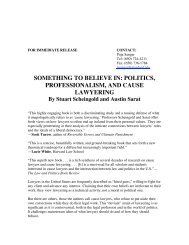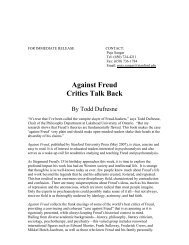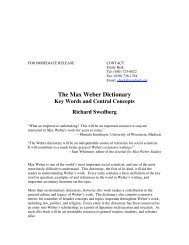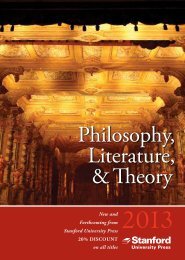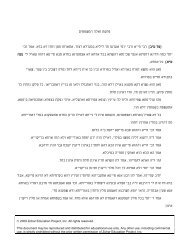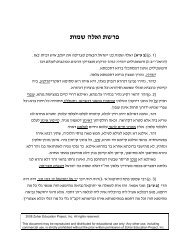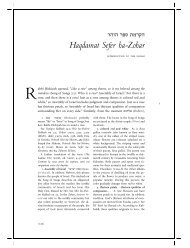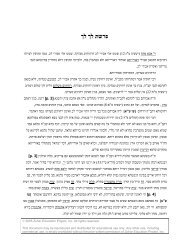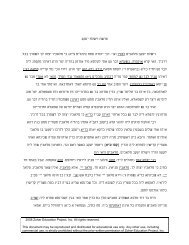Front Matter (PDF) - Stanford University Press
Front Matter (PDF) - Stanford University Press
Front Matter (PDF) - Stanford University Press
Create successful ePaper yourself
Turn your PDF publications into a flip-book with our unique Google optimized e-Paper software.
mystics of both Spain and Ashkenaz, were much concerned with establishingthe<br />
the<br />
precise proper wordingof each prayer. The text of the prayer book had<br />
mostly ®xed by compendia datingfrom the tenth century; in the Middle<br />
been<br />
however, it became the object of commentaries, many of which sought to<br />
Ages,<br />
their authors' own theologies re¯ected in these venerated and widely<br />
®nd<br />
texts by the ancient rabbis. This is especially true of the kabbalists,<br />
known<br />
devoted much attention to the kavvanah, or inward meaning, of liturgical<br />
who<br />
prayer.<br />
fourth strand of earlier tradition is that of Merkavah mysticism. Merkavah<br />
The<br />
designates a form of visionary mystical praxis that reaches back into the<br />
era but was still alive as late as tenth-century Babylonia. Its roots lie<br />
Hellenistic<br />
to Apocalyptic literature, except that here the voyager taken up into the<br />
close<br />
is usually offered a private encounter with the divine glory, one that<br />
heavens<br />
not involve metahistorical predications. Those who ``went down into the<br />
does<br />
sought visions that took them before the throne of God, allowing<br />
merkavah''<br />
to travel through the divine ``palaces'' (heikhalot), realms replete with<br />
them<br />
and, at the height of ecstasy, to participate in or even lead the angelic<br />
angels<br />
The term merkavah (chariot) links this tradition to the openingvision<br />
chorus.<br />
the prophet Ezekiel, which was seen as the great paradigm for all such<br />
of<br />
experiences and accounts. It is also connected to the qedushah for-<br />
visionary<br />
(``Holy, holy, holy is YHVH of hosts; the whole earth is ®lled with His<br />
mula<br />
of Isaiah 6, since it is this refrain that most Merkavah voyagers recount<br />
glory!'')<br />
angels singas they stand with them in the heavenly heights.<br />
hearingthe<br />
Merkavah tradition was known to the medievals in two ways. Treatises<br />
The<br />
those who had practiced this form of mysticism, often preserved in fragmentary<br />
by<br />
and inchoate form, were copied and brought from the Near East to<br />
Europe, as we shall see below. But just as important were the references<br />
western<br />
to Merkavah practice in the Talmudic literature itself, a fact that lent<br />
to the fascination that latter-day mystics clearly felt for this material.<br />
legitimacy<br />
great Talmudic sages as Rabbi Akiva and Rabban Yoḥanan son of Zakkai<br />
Such<br />
associated with Merkavah traditions. Akiva, considered in some aggadic<br />
were<br />
to be a sort of second Moses, is the subject of the most famous of all<br />
sources<br />
accounts of such mystical voyages. He alone, unlike the other three of<br />
rabbinic<br />
``four who entered the orchard,'' was able to ``enter in peace and leave in<br />
the<br />
While some modern scholars question the historicity of associatingthe<br />
peace.''<br />
rabbinic sages with Merkavah praxis, in the Middle Ages the Talmudic<br />
early<br />
were quite suf®cient to sustain this link. It was the philosophic questioners<br />
sources<br />
of the Merkavah traditions, rather than their mystical supporters, who<br />
hard-pressed to defend their views. Merkavah traditions also had considerable<br />
were<br />
in¯uence on the rabbinic liturgy, and this association too raised their<br />
in medieval eyes.<br />
esteem<br />
®fth and ®nal element of this ancient legacy is the hardest to de®ne,<br />
The<br />
Introduction<br />
xxxii<br />
partly because it hangs on the thread of a slim body of text, but also because it



